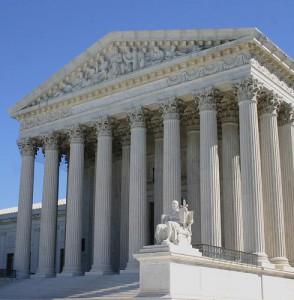On the Hill: The Religious Makeup of the Supreme Court (and Who Will Replace Scalia?)

Justice Antonin Scalia, the conservative stalwart of the Supreme Court, died in mid-February in West Texas while on vacation at a friend’s ranch. Scalia himself was a divisive figure able to stir intense emotions within both political parties and the American people as a whole. Many loved him for his commitment to interpreting the Constitution based on what he believed was its original intention, while others hated him for his apparent indifference or even outright hostility towards the rights of minority communities, whether they be gay, black, or nontheistic.
In the immediate aftermath of his death, both Democrats and Republicans on Capitol Hill started scheming about how best to play the situation to their advantage; Republicans are seeking to punt the issue until after the presidential election, while Democrats want to confirm a candidate in the coming weeks.
Senate Majority Leader Mitch McConnell, who has the most control over whether President Obama’s eventual nominee is confirmed by Congress, started his party’s obstructionism of the nomination by stating that “the American people should have a voice in the selection of their next Supreme Court justice. Therefore, this vacancy should not be filled until we have a new president.” His objection to approving a nominee was almost immediately echoed by every Republican on the Senate Judiciary Committee, which is tasked with reviewing the potential nominee before he or she is voted on by the full Senate; each of the senators on the committee have pledged not to allow a hearing on a Supreme Court nominee before the election concludes.
Democrats obviously disagree with this hold on the nominations process, as they maintain control of the White House and would be the ones to pick the next justice. Senator Harry Reid, Minority Leader of the Senate, even personally attacked the Senate Judiciary Committee chairman for refusing to meet with the President to discuss the topic: “Think about that. The president of the United States calls a very senior senator here and doesn’t even respond to the president. This is a sad day for one of the proudest committees in the United States Senate. We don’t have to go back to 1980 or 1982 to prove the current chairman’s ineptness. Look at the spike in judicial emergencies that occurred on Chairman Grassley’s watch just in the past year.”
Regardless of how people felt about the judicial opinions of the former justice, his unexpected death has opened up an opportunity, not just for partisan bickering in the Senate, but also for the Supreme Court to increase its religious diversity.
Currently, five Catholics and three Jews sit on the Supreme Court (the sixth Catholic was Scalia). According to a recent Pew survey, Catholics only make up around 21 percent of all Americans, while Jews only make up around 2 percent of the total population. So how is it that these two religious groups have completely dominated a vital part of our federal government, and how can we be sure that they are able to represent the interests of other religious and nonreligious groups in cases that come before the Court? Can we truly trust in the Court to respect the religious rights of all Americans with the current religious makeup of the Court’s justices and with their troublesome rulings on cases like Hobby Lobby and Town of Greece?
An easy solution to this problem would be to increase religious diversity on the Court, starting by adding either a member of a non-Abrahamic faith or a person of no faith at all. Such candidates already exist, and one potential candidate, Sri Srinivasan, could actually be nominated by President Obama in the coming days. Srinivasan, a Hindu, is a circuit judge of the United States Court of Appeals for the District of Columbia Circuit, a position which he was confirmed for by a Senate vote of 97–0 in 2013. Srinivasan has extensive legal and judicial experience, including serving as Principal Deputy Solicitor General of the United States and arguing twenty-five cases before the Supreme Court. And seeing as how he was unanimously confirmed by the Senate just a few years ago for a federal judgeship, Republicans in Congress would have a hard time blocking his nomination on the grounds that he isn’t qualified or lacks bipartisan support.
This nomination to the Supreme Court has long-lasting political and legal implications, which is why I’m hopeful that President Obama nominates someone who not only supports the progressive values of humanism, but comes from a religious or non-religious tradition that differs from the current religious makeup of the court.
